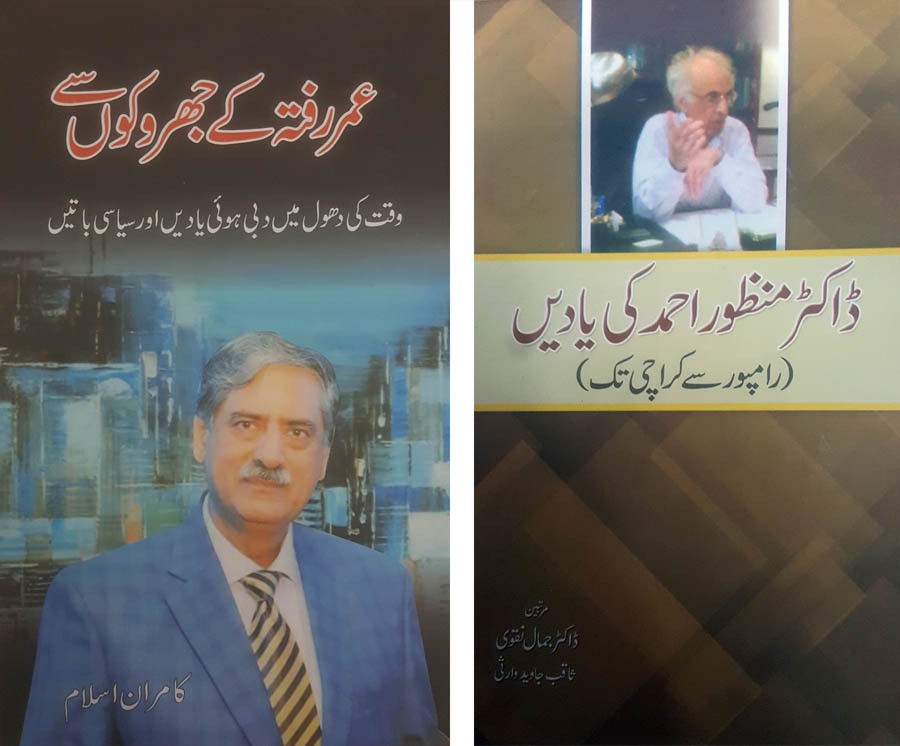
One recent memoir tells us about the formative phase of a genuine scholar and another is a testament of a political worker and peace activist

Dr Manzoor Ahmad is arguably one of the most well-read and learned men of Pakistan. An academic, philosopher and author, he has challenged dogmatic ideas with a rationalist approach in his books and writings.
Apart from teaching Philosophy at Sindh Muslim Law College and Karachi University for more than four decades, he has penned more than a hundred scholarly articles that were published in renowned journals of the world. Some titles of his books are: Tareekh-e-Falsafa, Morality and Law, Pakistan: Prospects and Perspectives, Iqbal Shenasi, and Islam; Chand Fikri Masail.
After completing his Masters in Philosophy from Karachi University, he went on to do his doctorate from University of London. Later, he served the Karachi University in various capacities and served as vice chancellor of a few private universities as well.
His book on Iqbal is ground-breaking because he critically evaluates the poet and his stature without being reverential. Similarly, with his book on Islam he ruffled many feathers when he emphasised the need for ijtihad.
Dr Ahmad began jotting snippets from his early life at the behest of his friend. So in this book, he is narrating his early days that he spent in Rampur, his birthplace which was once a full-fledged state in India. Professor Jamal Naqvi and Saquib Javed Warsi have compiled these scattered pages into a book titled Dr Manzoor Ahmad Ki Yadein -- Rampur Se Karachi Tak.
Dr Ahmad was born in 1934 in a religious family; his father Haji Mian was a spiritually inclined person. He ensured that his son receives necessary religious education. His family wanted Dr Ahmad to memorise the Quran and he began the learning process under a Maulvi, but was able to abandon it halfway with the help of his elder brother Hamid. After that, their father had him admitted into a school.
He recounts his days at school gleefully as Rampur had a vibrant education system due to the services of Sir Raza Ali Khan and Khwaja Ghulam Saiyidain. He describes the atmosphere at his school and college very well by adding references to various teachers that taught him. Dr Ahmad was addicted to the books and thoughts of Maulana Maududi in his younger days and later became an avid follower of the Maulana.
After arriving to Pakistan in 1950, he wanted to pursue medicine but opted for philosophy instead. These memoirs don’t follow a linear path, instead he discusses and shares whatever comes to his mind. Here is a life story of a renaissance man whose take on life is refreshing. The book tells us about the formative phase of a genuine scholar and how he fared in country like Pakistan. One wishes he could add another volume to his memoirs as it appears to be a bit short.
Another book of memoirs to have come out recently is by Kamran Islam, a peace activist and human rights campaigner whose dream is to see a normalisation of ties between Indiaand Pakistan. This is why he actively took part in the activities of Pakistan-India Peoples’ Forum for Peace and Democracy. Seeing peace between both countries is his lifelong dream, and that is why he has been working at the forefront of such peace initiatives.
Born in a Shinkiari, Mansehra, Islam spent his early days at Daska, Sialkot. Umr-e-Rafta Kay Jhrokon Se is his book of memoirs where he has attempted to recreate the days he spent in a small town. He remembers his early days and mentions the many sports he played and festivals he attended that were part and parcel of a typical Punjabi town in those days. Later, his family came to Lahore where he attended colleges and drifted towards student politics.
Islam joined the student wing of a religious party but ultimately landed in the National Students Organisation. When Zulfikar Ali Bhutto founded Pakistan People’s Party, Islam was thrilled and immediately joined him. In his memoirs he narrates all: the rise of Bhutto as well as his downfall, the Zia regime, the return to democracy and successive periods. He writes in a simple language.It is very heartening to see people belonging to Left parties writing their memoirs. This book is basically a testament of a political worker and peace activist.